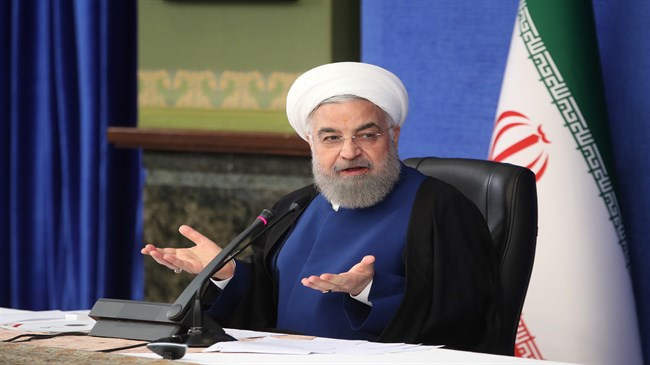Rouhani: Anti-COVID task force decisions based on collective wisdom

Iranian President Hassan Rouhani said the decisions of the National Task Force for Fighting the Coronavirus has always been made on the basis of scientific principles and collective wisdom.
In an address to a Saturday meeting of the anti-coronavirus task force, being the last one during the outgoing administration’s term in office, he added, “Each week, we made the decisions we found necessary. A total of 573 enactments were passed during the 78 meetings of the task force,” IRNA reported.
The president said the task force was established based on a decision by the Supreme National Security Council and following the approval of Leader of the Islamic Revolution Ayatollah Seyyed Ali Khamenei.
Rouhani noted that in the fight against the virus, “we had no choice but to rely on our own domestic capabilities”.
He said in the beginning of the outbreak in late February 2020, “o one helped us and, in addition, we have been under US unilateral sanctions” since 2018.
Rouhani added Iran has relied on its domestic capabilities in the production of medical devices, ventilators, oxygen concentrators, special hospital beds and face masks and has proved successful in this regard.
He described as two major achievements of his administration development of homemade COVID-19 vaccines and handling of the public vaccination process in the country.
Rouhani said his administration has also managed to strike a balance between people’s health and livelihoods since the outbreak, adding that all parties and groups with various inclinations helped the administration with a united voice in the battle against the pandemic.
Last month, Iran’s Health Minister Saeed Namaki said the country will become one of the world’s biggest producers of the COVID-19 vaccine by the end of summer.
Iran has already granted emergency use authorization to Russian-made Sputnik V vaccine, Covaxin made by India’s Bharat Biotech, Oxford/AstraZeneca developed by Russia’s R-Pharm Group, and the AstraZeneca-SKBio made in South Korea.
In June, Iran approved the first homemade COVID-19 vaccine, known as Coviran Barekat, for emergency use. It has also developed another homegrown jab in cooperation with Cuba, known as Soberana 02.
Third Japanese consignment
On Friday night, Iran received the third batch of AstraZeneca COVID-19 vaccine donated by Japan, according to mashreghnews.ir.
The consignment, containing 725,940 doses of the vaccine, arrived at Imam Khomeini International Airport in coordination with the Iranian Health Ministry.
Earlier in the day, the second consignment, comprising over one million doses, was delivered to Iran, according to Tasnim News Agency.
Japan has so far sent 2,911,810 doses of the jab to Iran.
Deaths, infections
Iran’s Health Ministry announced in a statement on Saturday that the country’s daily COVID-19 deaths and infections reached 286 and 19,846, respectively, in the past 24 hours.
According to the statement, the total COVID-19 death toll and infections since the beginning of the outbreak in the country stand at 90,630 and 3,871,008, respectively.
It added that 5,455 COVID-19 patients are in critical condition, and of the newly-detected cases, 2,620 individuals have been hospitalized.
The ministry said 3,367,272 COVID-19 patients have so far either recovered from the disease or have been discharged from hospitals.
It also announced that 25,917,921 coronavirus diagnostic tests have so far been carried out in the country, and 12,239,837 doses of COVID vaccine have been administered.
The Health Ministry said 285 cities in the country are coded red (very high-risk), while 110 are in the orange zone (high-risk).
Based on a decision by the National Task Force for Fighting the Coronavirus, travel to and from these cities is prohibited.
The number of the country’s yellow (medium-risk) and blue (low-risk) cities are 53 and zero, respectively, according to the ministry.
The country has been grappling with a fifth wave of the COVID-19 pandemic since a few weeks ago, mainly sparked by the spread of the Indian coronavirus variant, known as Delta.
Tehran Grand Bazaar and banks as well as all public and private organizations and offices in the Iranian capital were closed for six days, during July 20-25, in an effort to curb the pandemic in the province.
The same closures and COVID restrictions were enforced in the northern province of Alborz, neighboring Tehran.
Record low compliance
Among the reasons for the fifth wave of infections in Iran are lower compliance with the health protocols and the higher transmissibility of the Delta variant.
Speaking on Saturday, the Health Ministry spokeswoman Sima Sadat Lari said compliance with the health protocols in the country has dropped to 39.22 percent, the lowest over the past 12 months.
This comes as the spokesman of the anti-coronavirus task force Alireza Raeisi noted on the same day that 29 provinces in the country are grappling with the rapid spread of the Delta variant and the number of hospitalizations are quickly increasing.
Source: Iran Daily

